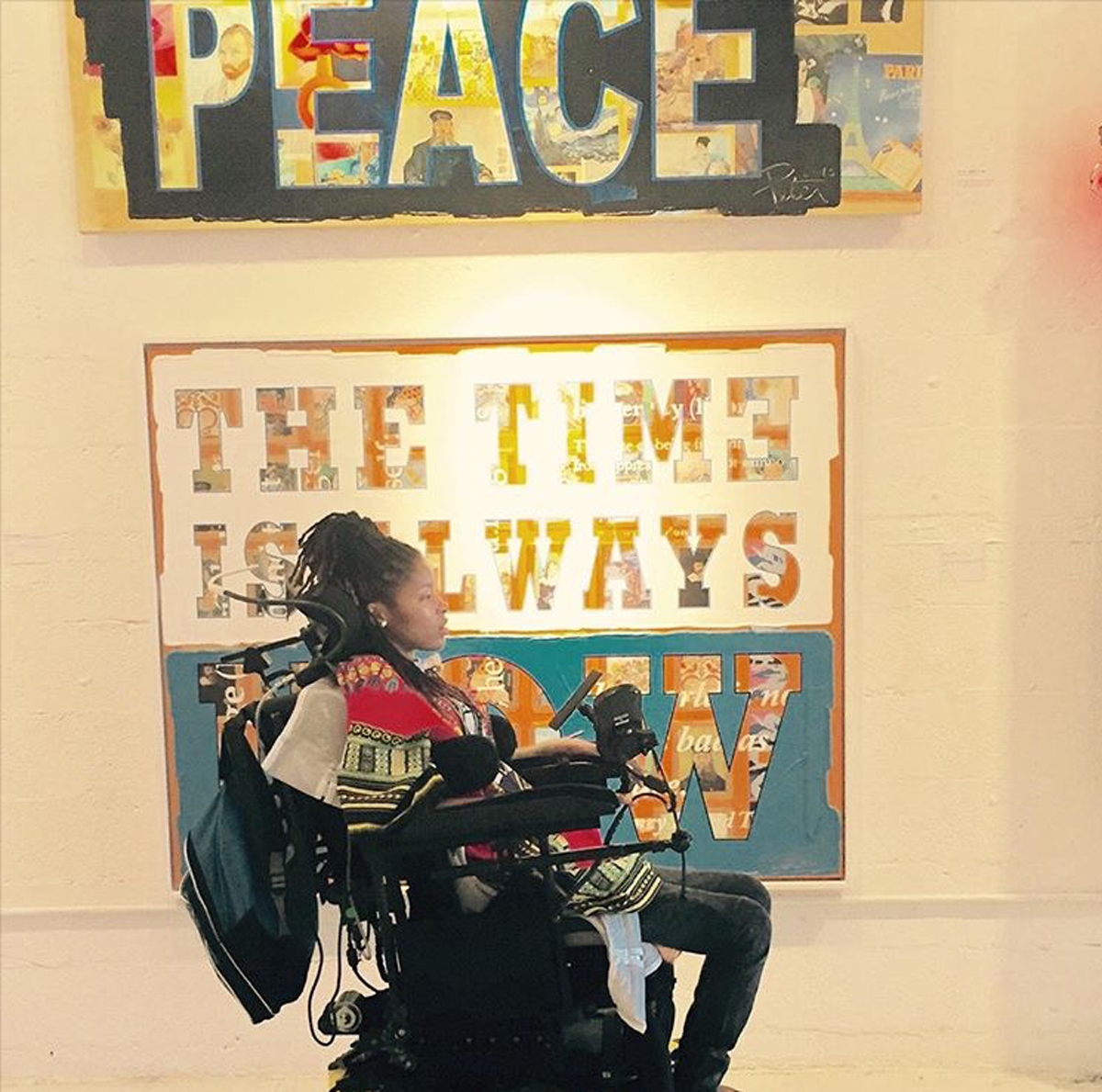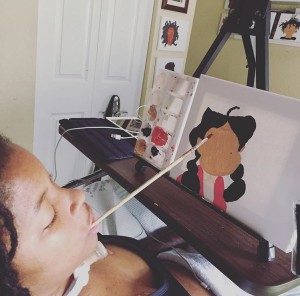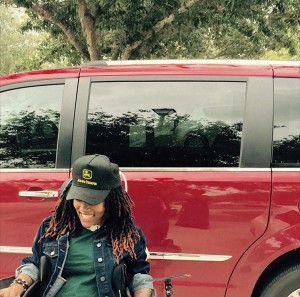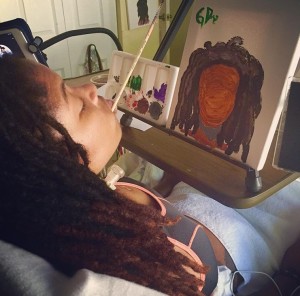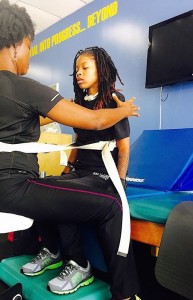Meet Glenneisha Darkins, a 23-year-old quadriplegic painter [INTERVIEW]
Often times our young adult minds lead us to a carefree, self-centered life in a world far bigger than our immediate environment. A lot of times we don’t even consider that at any moment our lives could change. Glenneisha Darkins, a visual artist from Miami, Fl., had a serious wakeup call in 2010– less than a month before her 19th birthday. This moment would change her life and the lives of those around her forever.
Darkins was just a college student trying to get home to her family for the holidays when she was struck in a life threatening car accident that left her a quadriplegic.
A quadriplegic is a medical term describing a person who is permanently unable to move or feel both arms and both legs because of injury or illness. Despite her inability to use her arms to pursue her passion, the 23-year-old painter does all of her work with her mouth.
If you’re a hashtag surfer, you may have come across her amazing afro-centric paintings on the explore page of your Instagram once or twice, but how often do you dig into the backstories? Meet Glenneisha Darkins and learn how she found her purpose through adversity.
Q: So how did you get started with painting? When did you get into that?
A: It happened at the beginning of the year actually. Around like February, March. I saw this video of this guy who had no arms and he was painting with his feet so I was kind of inspired because I wanted a new outlet of getting my frustrations out and I wanted to express myself in a new way because I did write a book like last year but I wanted to do something else. So I started to teach myself how to do lines, circles how to make facial expressions but I wasn’t really feeling that, so I left the facial expressions out and I just started to do just the faces. After I saw that, I just know I could do it. YouTube videos and my nurse helped me out. We bought a whole bunch of stuff from Michaels and we just did everything freestyling.
Q: You mentioned that you wrote a book, tell me a little more about your book.
It’s called Freedom Chair: An Open Diary of a Quadriplegic. It’s everything from when the accident happened (when I woke up in the hospital). It’s little entries that I’ve been writing that have been like diary entries that I wrote when I was feeling angry, sad, depressed, lost and confused. I didn’t know what to do or how to react, so I was just writing. So I made a compilation. There’s a part one, part two and part three. I got the idea from Anne Frank because I read her book like four or five times and it was a part book. And the Alchemist book also. I talked to my mom about how she feels. So it’s from her perspective and my perspective because from a parents perspective, to see your child go through this is unbearable. It’s something you can’t really describe. The book is in detail and I try to be as raw as possible because it’s something the people need to hear. They see the physical part of me smiling on Instagram but they don’t understand that it comes with a lot. Everything that I’ve gone through and that I’m doing now I had to pray for it, write about it and be more open with myself and be more accepting of where I am and how I look and what changes that had occurred since my accident. And it’s just something relatable as well. You may not be in a chair or physically or mentally disabled but everyone is going through something. Everything you go through you grow through. It’s kind of cliché but it’s real, its life and I wrote it. I just want everybody to understand that. This is not a walk in the park for me. I have my days and I’m going through them and I know how to approach them better.
Q: You’re referring to the accident, what kind of accident was it? What exactly happened?
It was November 24, 2010. I was going to FAMU (Florida Agricultural and Mechanical University) and I was in Tallahassee, FL and I wanted to come home (to Miami) for the holidays. Thanksgiving actually. Long story short, I don’t recall but obviously my seatbelt was off, I don’t know because I always wear it. Unfortunately the guy was speeding or sleeping, from there I flew out of the windshield in the front. I was 25 yards away from the accident. It was a surprise that they even saw me because I wasn’t even near the accident. I had a head injury. I had a thick glass in my brain. My neck injury is a C1-C2 which means I couldn’t do anything from the neck down. I couldn’t talk, couldn’t eat. I couldn’t do anything. So I was thrown out of the windshield so it was a pretty traumatic accident. Actually myself and the driver were in the same situation but everybody else just walked away free.
Q: So you and the driver of the car you were in have the same injuries?
Pretty much. We’re both in a chair. We’re both quadriplegics. We’re both unable to use our hands or our legs.
Q: Do you guys still keep in touch?
Yea, yea. We keep in touch mostly, you know. I always reach out. He’s cool. He did have his moment where he blamed himself for the misfortune of my life because he had someone else’s life in his hands. Once I saw him I said, “It’s really not your fault. Things happen,” and from there we have just been the best of friends. It’s actually a small world because his family and my family know each other. And I’m the godchild of his cousin. So it just worked out like that.
Q: I know the beginning of it was hard and frustration and now you’re starting to come to terms with it, does it really get better?
It does. It does mentally as well. It’s like a seventh sense I have. It really sucks that something traumatic has to happen to a person for them to get it. And understand life and understand their full potential and what they can do. So it kind of sucks that I had to go through this to get that. But when I go to therapy I’m more motivated, more inspired. I’m very optimistic. I’m not as negative as I used to be. I know it will be better. They say when you manifest something in your brain, it comes to life. You think and you create. So I try my best to be as optimistic as possible and not look at the negative—what I can’t do and focus on what I can do. I know it will get better.
Q: Have the doctor’s told you that you won’t be able to do anything on your own again or is it one of those situations where it could possibly happen?
Doctors (chuckles), of course they’re going to say that. It’s unfortunate but it’s probably not going to happen, but at the same time I don’t believe that. I feel like when I go to therapy, and when I do exercises, I feel like I do have a chance to walk again. I’ve seen miracles. I’ve seen things happen. It’s mind over matter. And when you think about it, it can happen, it will happen. Of course they’re going to say it’s unfortunate that you might not be able to do this or that. They said that in the beginning. They also said that my hair wouldn’t grow back, they also said that I couldn’t move my neck. They also said that I probably wouldn’t move my neck or my shoulders. They said a lot of things. And I’m like okay, why am I moving my shoulders now? Why am I leaning forward? Why is my hair like a bush right now? They said a lot of things, but that’s their job. So I don’t take it personal. I did before but again, when I go to physical therapy, it’ like they give you hope and if I could just move my hands, that would be great. I’m not to pressuring if I can walk because it is what it is. I know there’s a will and a way that I can move my hands and breathe on my own again. So it’s probably not possible but to me, it’s possible.
Q: If you were able to start using your hands again, would you continue to do the paintings with your mouth or would you try to start doing that paintings with your hands?
I would probably do both. I never painted a day in my life before my accident. I was never the artist. I was never into everything that I’m doing now. So when I did start it’s kind of mind blowing. So I want to do both. I might not be able to have the full use of my hands. I’m sure they’ll work but not like how it use to work. You know, it’s never going to be the same but it will work. I’ll probably do both because I don’t want to forget how I started and how inspirational that part was. My hands would be great too but my mouth is more balancing and more therapeutic to me.
Q: Is there anything else that you want to get into? Is there anything else that’s been on your mind that you want to try to venture into?
To be honest, I like modeling a lot and taking pictures. That’s one thing I would love to do. I’m also into computers. As for now I’m just all into painting and being a creator.
Q: What’s your take away from your accident and what your life is like now?
I know why it happened. I never thought how I think today. And I was running wild and free in my adolescent days when I was about 18 and 19, I was out of high school, you know, I was free. I didn’t pay attention to signs. In my opinion I honestly believe that I was forced to sit down and pay attention. Of course I had to see what the most high wanted me to see. So I had to be forced and put in a situation where I had to be completely dependent on him. That’s my take on the accident; I had to open my eyes and really understand what life is about, what’s important and how unappreciative I was and how I took some things for granted. He wanted to show me that I had more potential than what I’m trying to settle for. I felt like I was just settling and existing before. Right now, I’m living for this purpose, this extreme purpose that I have to step into or else it’s going to fly right by me and this accident will be meaningless. So this accident is more like a wakeup call. A second chance to live the purpose that I’m supposed to be living now.
Q: Is it still hard to talk about?
It used to be but not anymore. I like talking about it. I don’t think people can fathom being in a position where they have to depend on somebody else. I used to think like that but, nah.
Q: How is your relationship with your mom now?
We weren’t as close before. Daughters and mothers have their days. My mom and her mom never had that “relationship” and my mom vowed to never to display those type of actions or behaviors towards me. She hated that I didn’t call her or that I didn’t check on her [while I was away] at college but now it’s like we have this cohesiveness now. Everybody is so close and understanding of each other. She has her days too but she’s amazed at the things that I say and I do now and it’s like we understand each other. Were like best friends which is really all she wanted. So this accident was actually a blessing for both of us because she had to learn something and I had to learn something. We both learned that we could break the barriers in our families. We can be friends. We can be a daughter and a mother. At the end of the day it’s just us. I didn’t have my father. He was in jail. He found out about my accident in prison of course. I never had him in my life; he was always in and out. So when it happened, all I had was her.
Q: Even though your dad found out in prison, did that relationship change at all?
Not at all. And that really sucks. We’re both alike. He also had an accident too. And he’s paralyzed in one hand. I thought maybe we can relate to each other. And it’s like his accident didn’t teach him anything and I feel like mine did so we have nothing to talk about. And I try to tell him about the things that I do but I can’t be open because I don’t know him. I don’t have a relationship with him. It hurts but at the end of the day, I’m stronger now.
Q: Have you lost any friends due to this?
Of course. I lost a lot of people. And I have kept some people at a distance because I’ve seen how they say things and don’t act on it. I’m in a vulnerable state and I want to take everything seriously. In this situation I’m more needing of someone to talk to, someone to be around. I’ve lost some friends that I didn’t need and also gained some that want to be around. And it really sucks because the ones that wanted to be around, I didn’t really appreciate and I overlooked that for the people that I wanted to be “that friend”. Before, I didn’t understand why I was favoring certain people when in actuality it’s all about actions and not words. And I had to learn that.
Q: What do want your legacy to be?
The girl that never gave up. I wanted them to see everything, from therapy to the growth. Being very optimistic.
Q: What advice can you give to someone who has been in a traumatic/non-traumatic accident or a person who just wished they weren’t alive?
What I’ve learned is to embrace the feeling that the person is currently feeling. But understand that it’s just something that passes through. When we don’t label feelings but just embrace it. Understand it’s there and still think about how far we’ve come and where we could’ve been—I mean, thinking about suicide it wouldn’t even cross my mind right then and there anymore. And so you have those people or a friend that motivates you and remind you of the things that you can do. They focus on what you can do and remind you of how miraculous that accident was. It’s the experience that’s gratifying that makes you understand, “Wow, I’m really blessed to be able to walk from something so traumatic.” It’s like something that could just almost end your life, and you could walk away from that—it’s something to be humbled about. To be grateful and thankful about. So I would tell them no matter what you’re going through right now, it’s understandable. You can complain, it’s okay to complain but it’s not okay to dwell in it. And it’s not okay to dwell in something that you walked away from. Think about how you walked away from it and how you are blessed to still function and how blessed you are to have experienced it and still be here today to talk about it. Glenneisha is now in her junior year at Florida International University studying Psychology with a minor in Sociology. She hopes to one day be a public speaker and advocate for youth and people who have been in traumatic incidents and maybe even dip into wheelchair modeling on the side.
https://instagram.com/p/6v4KHTgzwA/?taken-by=glen.neisha
